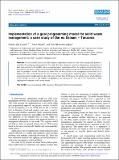| dc.description.abstract | Abstract – In this research article, the multi-objective optimization model for solid waste management problem is
solved by the goal programming method. The model has three objectives: total cost minimization, minimization of
final waste disposal to the landfill, and environmental impact minimization. First, the model is solved for the higher
priority goal, and then its value is never allowed to deteriorate. The model is solved for the next priority goal and so on
until the problem is solved. The model was tested with real data for solid waste management system from Dar es
Salaam city. The results determine the best locations for recycling plants, separating plants, composting plants,
incinerating plants, landfill and waste flow allocation between them. Furthermore, the solution shows a high reduction
of the amount of waste to the landfill and greenhouse gas emissions by 78% and 57.5% respectively if fully
implemented compared to the current system. | en_US |

